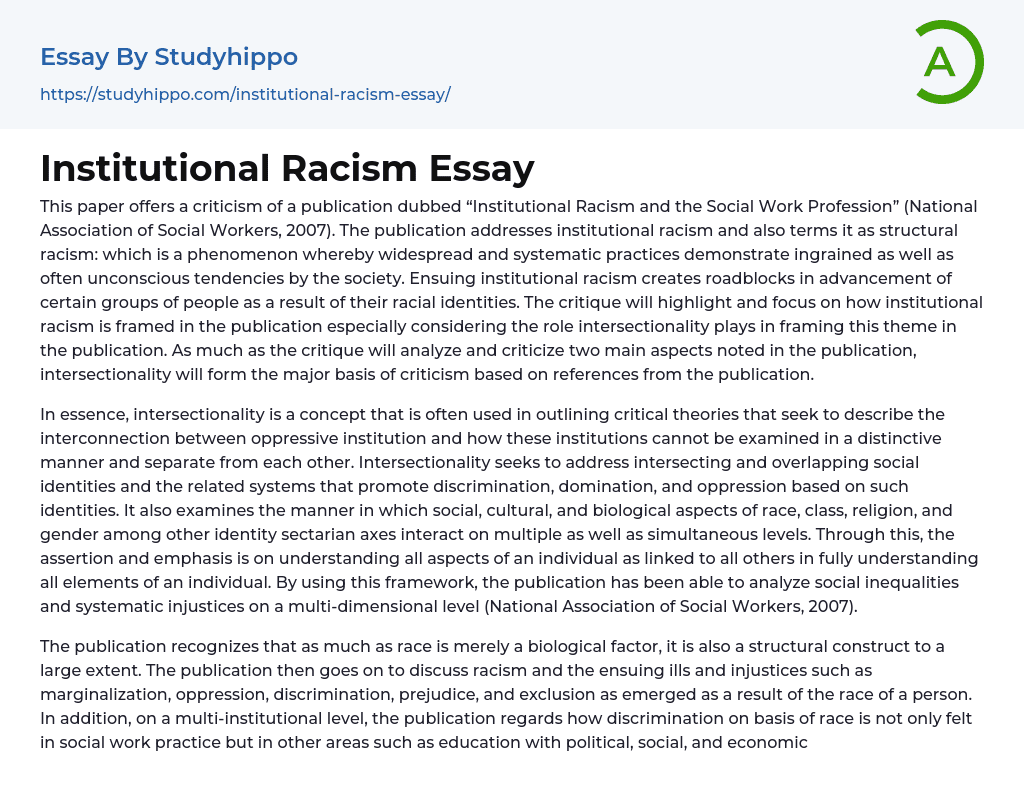This paper provides a critique of a publication called "Institutional Racism and the Social Work Profession" (National Association of Social Workers, 2007). The publication examines institutional racism, also known as structural racism, which refers to widespread and systematic practices that demonstrate deeply ingrained and often unconscious biases in society. The presence of institutional racism hinders the progress of certain racial groups. The critique will specifically address how the publication frames institutional racism, particularly with regard to the role of intersectionality in shaping this theme.
The critique will primarily focus on intersectionality, as referenced in the publication. Intersectionality is a concept that explains how interconnected oppressive institutions cannot be examined individually. It aims to address overlapping social identities and the systems that promote discrimination and oppression based on these identities. It also examines how factors like race, class, religion, and gender interact simultaneousl
...y on different levels.
In 2007, the National Association of Social Workers emphasized the significance of comprehending all aspects of an individual and their interconnections. Their publication employs this framework to examine social inequalities and systematic injustices from a multi-dimensional perspective. The publication recognizes that race is not solely a biological factor but also a structural construct. It then explores the subject of racism and its adverse consequences, encompassing marginalization, oppression, discrimination, prejudice, and exclusion. Additionally, the publication draws attention to how racial discrimination extends beyond social work practice and impacts other domains such as education and various institutions. Political, social, and economic policies can contribute to discriminatory outcomes while favoring certain racial groups.
The paper discusses the interconnectedness and inseparability of discriminative institutions, using the United States as an example. It highlights the historical
debate surrounding the definition of whiteness in America, which has led to significant discrimination against Black and Latino individuals (Rosenblum & Travis, 2016). The publication also explores Critical Race Theory (CRT), a social science framework that applies critical theory and intersectionality to analyze how culture, society, law, race, and power intersect (Jensen-Hart & Williams, 2010). By employing intersectionality, it examines how institutional racism in the United States is influenced by both biological and cultural factors that shape one's identity. This discriminatory system is deeply ingrained in various institutions through their procedures, policies, and practices, resulting in unequal outcomes for different groups of people. The paper argues that all factors contributing to one's identity play a role in creating these disparities (National Association of Social Workers, 2007).
Reference
- Jensen-Hart, S., & Williams, D. J. (2010). Blending voices: Autoethnography as a vehicle for critical reflection in social work. Journal of Teaching in Social Work, 30(4), 450–467.
- National Association of Social Workers. (2007). Institutional racism and the social work profession: A call to action. Retrieved from http://www.socialworkers.org/diversity/institutionalracism.pdf
- Rosenblum, K. E., & Travis, T. C. (2016). The meaning of difference: American constructions of race, and ethnicity, sex and gender, social class, sexuality, and disability (7th ed.).
McGraw-Hill is located in New York, NY.
- Aesthetics essays
- Art History essays
- Artist essays
- ballet essays
- Body Art essays
- Color essays
- Concert Review essays
- Creativity essays
- Cultural Anthropology essays
- Ethnography essays
- Harlem Renaissance essays
- Heritage essays
- Modernism essays
- Mona Lisa essays
- Pastoral essays
- Postmodernism essays
- Realism essays
- Symbolism essays
- Theatre essays
- Visual Arts essays
- Voice essays
- Work of art essays
- African American essays
- African American Culture essays
- American Values essays
- Asian American essays
- Chinese essays
- Ethnicity essays
- Ethnocentrism essays
- German essays
- Han Chinese essays
- Hispanic essays
- Identity essays
- Korean essays
- Mexican essays
- Nation essays
- Native American essays
- Race and Ethnicity essays
- White People essays
- Ageism essays
- Cultural Diversity essays
- Discrimination essays
- Diversity essays
- Gender Discrimination essays
- Multiculturalism essays
- Oppression essays
- Peer Pressure essays
- Racial Profiling essays
- Sexism essays




